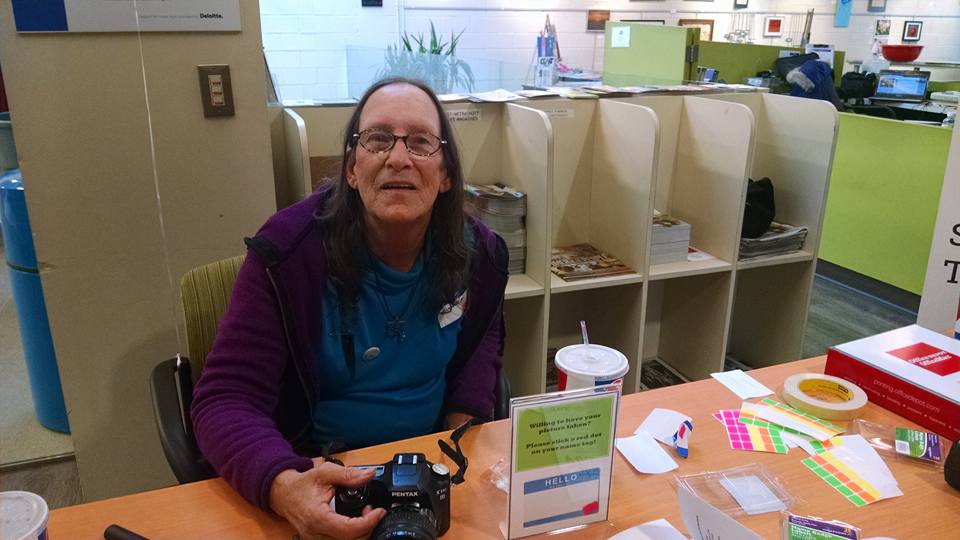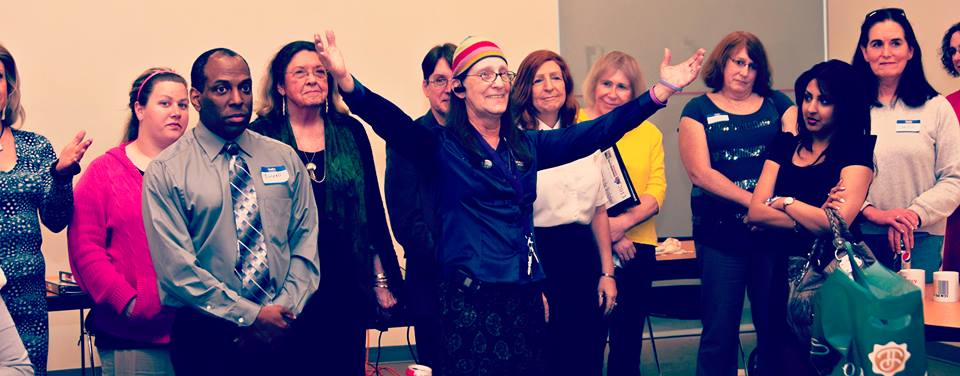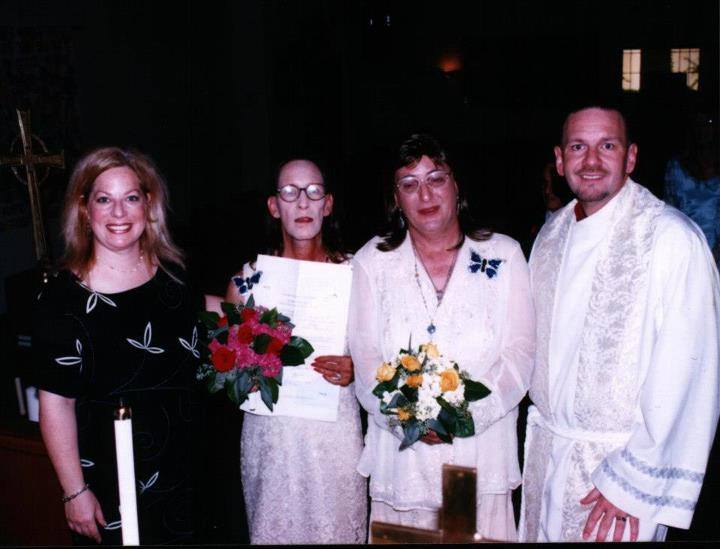This transgender woman’s advocacy helped her lifelong dream come true.
This is part of a story series about the lives of transgender people. Read the introduction here.
 When Michelle Fox-Phillips first realized she wanted to be a girl, she was only two or three years old. She and her male cousin were very close, like brothers, and one day they were taking a bath together.
When Michelle Fox-Phillips first realized she wanted to be a girl, she was only two or three years old. She and her male cousin were very close, like brothers, and one day they were taking a bath together.
Curious in the way most kids are, they tucked their tiny penises between their legs and said they were girls. It probably didn’t mean much to Fox-Phillips’ cousin, but it did to her.
“Something clicked in my brain, but I didn’t know what it was,” she says.
The feeling didn’t go away. Even though she didn’t have a name for it — and she couldn’t talk about it to anyone, because people generally didn’t speak of such things in the 1950s and ‘60s when she was coming of age — Fox-Phillips couldn’t shake the feeling that she was really female, not the male gender she was assigned at birth.
Around puberty, I started cross-dressing in my room, because I felt I needed it. I was fantasizing that I was Annette Funicello or Shelley Fabares from The Donna Reed Show. All through high school, I fantasized and cross-dressed in my room, wearing my mother’s clothes and lingerie.
I dreamed of getting married — the white gown, Daddy walking me down the aisle, the white picket fence. It was my fantasy for my whole life.
Fox-Phillips was closeted until after she separated from her first wife. She hid her cross-dressing from her wife and two sons, expressing her feminine self only when the children were asleep and her wife was out. But her wife came home unexpectedly one day and that, Fox-Phillips says, was the straw that broke the camel’s back.
She started screaming at me, ‘You pervert! I want nothing more to do with you.’ That played into my internal transphobia. I hated myself for being a cross-dresser, which was the only name I had for it. Why couldn’t I be normal? It took me many years to work through that, but I finally did five or 10 years ago.
After her first marriage ended, Fox-Phillips began identifying as a woman. She started taking hormones when she was 40 years old and was seeing a gender therapist. But she still didn’t necessarily think of herself as being transgender or queer, until her gender therapist wrote the report recommending her for sex reassignment surgery (SRS).
Fox-Phillips didn’t have SRS until she was 50 years old, partly because of financial constraints and partly because she was afraid of surgery. She was a heavy smoker and had a family history of heart disease. “I was afraid I’d go under the knife and not wake up,” she says. But she felt so strongly that she needed the surgery that she put her fears aside and went forward.
It was a courageous move, especially since Fox-Phillips didn’t really have a support system in place in 1998 to guide her through her transition. A friend mentioned Affirmations, and when she called about support services for the transgender community she was told they didn’t have any. What happened next was significant on many levels.
They asked me if I wanted to start a support group for transgender people and I said yes. I went through helpline training and facilitator training. I wanted to be on the helpline in case anyone called.
That’s when I came out of the closet and began identifying as trans. I had my surgery in October of that year and started my support group two months later. I continued that support group until about four years ago, and I was the first trans volunteer at Affirmations. I’m still very involved with Affirmations, particularly training new staff on trans issues.
Fox-Phillips’ involvement in Affirmations — for which she has been honored with the Jan Stevenson Award — was a catalyst for her doing much, much more to support the transgender community in Michigan. She served on the Board of Transgender Michigan, which she helped establish, and later co-founded Transgender Detroit. She also served on the Board of Crossroads and worked with the Triangle Foundation on their Equality Pride PAC (now all part of Equality Michigan), began a transgender support group for parents and allies at PFLAG Detroit, which is ongoing. Plus, she started hosting holiday dinners for people who didn’t have anywhere to go — a tradition that began in her living room and is now carried on at Affirmations.
 About four years ago, Transgender Detroit evolved into Gender-identity Network Alliance (GNA), with Fox-Phillips as its Executive Director. The organization not only continues the Transgender Day of Remembrance that Transgender Detroit began back in 2001, but it’s also introducing new programs to support the transgender community. This includes initiatives to offer a holistic approach to transitioning, and support for people who are already in the process of transitioning. GNA also started the Queer Legal Project, which launched with a two-hour program on the process of getting a legal name change. Fox-Phillips hopes to add other legal programs, in addition to services like a voice clinic.
About four years ago, Transgender Detroit evolved into Gender-identity Network Alliance (GNA), with Fox-Phillips as its Executive Director. The organization not only continues the Transgender Day of Remembrance that Transgender Detroit began back in 2001, but it’s also introducing new programs to support the transgender community. This includes initiatives to offer a holistic approach to transitioning, and support for people who are already in the process of transitioning. GNA also started the Queer Legal Project, which launched with a two-hour program on the process of getting a legal name change. Fox-Phillips hopes to add other legal programs, in addition to services like a voice clinic.
“GNA wants to make it as easy as possible for people to transition,” Fox-Phillips says. “We want to be a service activists’ organization.”
There’s no doubt that Fox-Phillips’ activism has created a support network for the transgender community that didn’t exist before she started pushing for it. She didn’t do it alone, but one person in particular was her helpmate in much of her work going back to her early days at Affirmations.
It wasn’t long after she came out that Fox-Phillips met Jamie Marie Phillips, who also identified as a woman. They served on the Board together at Transgender Michigan and co-founded Transgender Detroit.
 While they were doing so much good work for the transgender community, the couple fell in love. They were married in 2003, a day Fox-Phillips will never forget.
While they were doing so much good work for the transgender community, the couple fell in love. They were married in 2003, a day Fox-Phillips will never forget.
My dream came true. I got married. I had my Daddy walk me down the aisle and my oldest son was my best man. I even got to wear a beautiful dress. I lived out my dream.
Tragically, Fox-Phillips’ wife died just three years later. But by that time, Fox-Phillips had an entire community behind her — including her father and two sons, who fully accepted her transition. “ ‘No matter what, I will always be your dad,’ I told my sons when I came out to them when they were 11 and 13,” she says.
Today, Fox-Phillips continues her advocacy for the transgender community and is engaged in many endeavors, including the Trans* Visibility Art Gallery Opening on April 14. She has two pieces of her artwork in the gallery, which is sponsored by Affirmations and GNA.
Fox-Phillips has some good advice for the transgender community.
“People shouldn’t be afraid to transition — they should be proud of who they are, whether or not they want to put the label ‘transgender’ on themselves,” she says. “Don’t let society beat you down. There are so many resources now for transgender people. Just be proud of who you are.”
Read all the stories in this series HERE.
[Photos courtesy of Michelle Fox-Phillips.]



